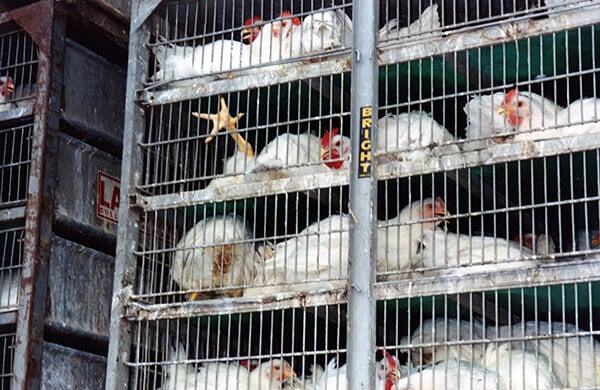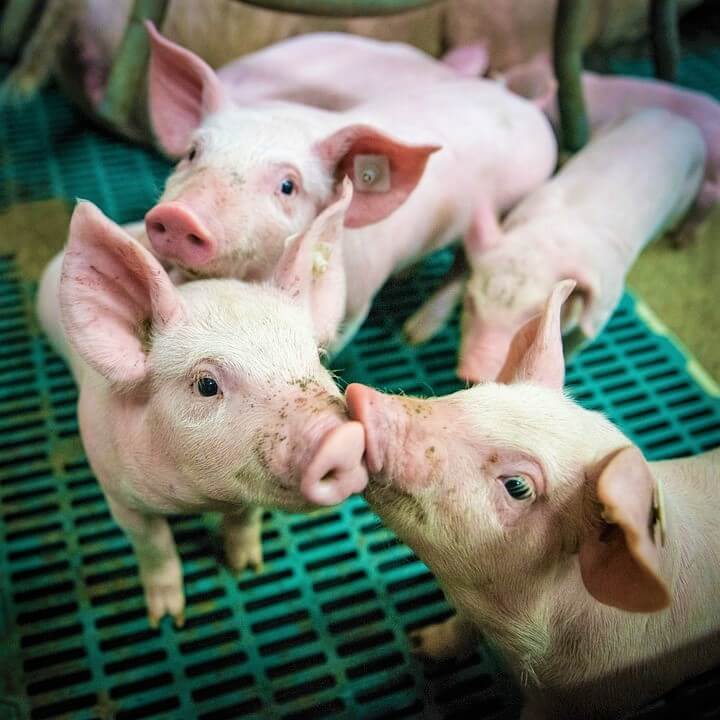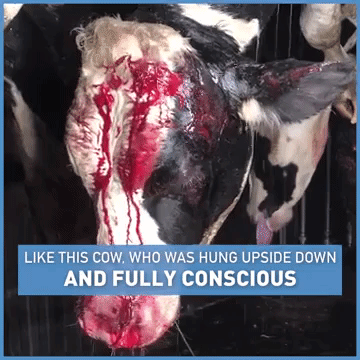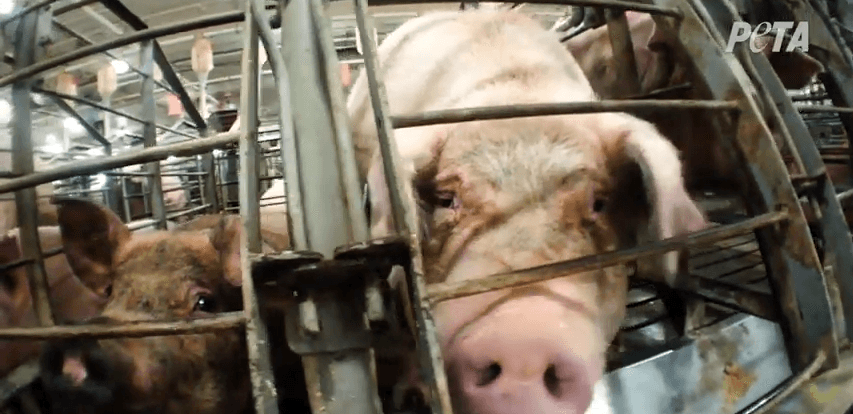PETA Reveals How Animals Really Die in Slaughterhouses, Disproving ‘Humane’ Claims
In the U.S. today, 99% of animals used for food live on massive industrial factory farms. Most won’t even feel the warmth of the sun on their back or breathe fresh air until the day they’re loaded onto trucks headed for slaughterhouses.

When they’ve grown large enough (far more rapidly than they ever would naturally, because of antibiotics and genetic manipulation) or their bodies have become worn out from producing milk or eggs, animals raised for food—even those who lived on so-called “humane” farms—are crowded onto trucks and transported for many miles through all weather extremes, typically without food or water.
At the slaughterhouse, the throats of those who survived the transport are slit, often while they’re still conscious. Many remain conscious when they’re plunged into the scalding-hot water of the defeathering or hair-removal tanks or while their bodies are being skinned or hacked apart.
Despite the tremendous suffering experienced by animals killed in slaughterhouses, many companies that use animals for food try to mislead customers into believing that their products are somehow “humane.” For example, a Facebook post by Smithfield Foods—a company with a long history of animal suffering both inside and on the way to its slaughterhouses—ridiculously claims, “At Smithfield, we’re taking good care of our animals—ensuring our pigs stay happy and healthy.”
Yet this PETA video recounts how 18 trucks hauling live pigs to just one Smithfield slaughterhouse have crashed, including five between January 2020 and May 2021. All these crashes caused pigs horrific fear, suffering, and painful deaths.
And that’s not all: Government reports obtained by PETA reveal that in November, Smithfield staff in an Iowa slaughterhouse had to shoot a bloodied pig three times in the head before ending the animal’s suffering. Workers also evidently inadequately gassed a pig in September in a South Dakota slaughterhouse, allowing the animal to regain consciousness while he or she hung upside down by a leg before being shot in the head.
Don’t buy into “humane-washing” attempts by Smithfield or any other company that kills animals for food. The only foods that are humane to other species are vegan ones.

You can take immediate action by reporting Smithfield’s deceptive post on Facebook for what it is: false information. When viewing the post on Facebook, click the ellipsis (…) that appears in the top right corner and then choose the last item on the dropdown list, “Report post.”
How Are Animals Killed in Slaughterhouses? PETA Uncovers Shocking Incidents of Cruelty From Across the Country
Pigs, cows, chickens, turkeys, and others used for food feel pain and experience fear. These animals value their lives, just as we do.
In many places across the country, state laws prohibiting cruelty to animals do not exclude species commonly used for food from protection—even when they’re inside slaughterhouses.
That’s why PETA digs through records to discover exactly how animals are killed in slaughterhouses and urges authorities to investigate botched killings or any other incidents of suspected cruelty that we find. When appropriate, anyone found to have committed an act of cruelty inside a slaughterhouse should be slapped with charges.
Report Reveals Chickens Were Scalded to Death in North Carolina Slaughterhouses
At two House of Raeford slaughterhouses in Duplin County, North Carolina, a federal agent saw a chicken scalded to death and/or drowned while the worker responsible for cutting birds’ throats was “dozing.” In other incidents at these facilities, the following occurred:
- A worker was “struggling to keep up with removing” birds who had been scalded to death and/or drowned.
- A live chicken was covered with dead birds in a bin.
- Federal staff had to intervene to prevent conscious chickens from being plunged into a tank of scalding water.
Chickens Drown in Electrified Water at Tyson and Perdue Slaughterhouses
At Tyson Foods near Waldron, Arkansas, chickens drowned in electrified water during a line stoppage. Five others—trapped in machinery—were struggling to breathe as water poured over their heads.
At Perdue Foods near Dillon, South Carolina, staff left a live chicken in a vat with up to 10 dead birds for more than 48 hours and then failed to put her out of her misery promptly once she was found. At another Perdue slaughterhouse, this one near the company’s headquarters in Salisbury, Maryland, a worker was “sitting there and … not doing anything” while chickens drowned in electrified water during a line stoppage.
9,100 Hens Freeze to Death in Subzero Temperatures on Trucks at a Slaughterhouse
More than 25,000 chickens transported from Ohio were left on trailers outside the Butterfield Foods slaughterhouse in Minnesota overnight as the wind chill plummeted to minus 32 degrees—slowly and painfully killing more than 9,100 of the birds.
Many hens froze solid, and the survivors were almost featherless, suggesting that they had been discarded after becoming worn out from being used as egg-laying machines before reaching this facility. Abandoning these birds, who were already in wretched condition, to die in agony warrants a criminal probe—and is indicative of the systemic cruelty of the meat industry.
Cow Shot Repeatedly at Meatworks Slaughterhouse in Massachusetts
An employee shot a cow in the head four times at a Meatworks slaughterhouse in Westport, Massachusetts. She was still standing and looking around after the first three shots, which were misplaced, and was finally incapacitated by the fourth shot. This wounded animal endured an extended period of suffering before finally being killed.
Incidents in which slaughterhouse workers repeatedly shoot animals in the head occur dismayingly often. Abattoir Associates in Pennsylvania repeatedly shot at least five animals in August alone and another one in September.

Botched Killing of Pig at Illinois Slaughterhouse Prompts Call for Criminal Probe
According to a U.S. Department of Agriculture (USDA) report, a federal veterinarian found that a pig hanging upside down on a slaughter line in Illinois was still alive and crying out after going through a carcass-washing cabinet. The veterinarian told a worker to stun the animal, but instead, the worker cut the conscious pig’s throat before the vet could stop him. The pig cried out again, and the veterinarian urged employees to stop the slaughter line—but the pig was plunged into a tank of scalding-hot water, thrashing and screaming before finally being shot.

Turkeys Suffer at Jennie-O and Kraft Heinz Slaughterhouses
At two Minnesota slaughterhouses operated by Jennie-O Turkey, turkeys sustained broken wings and legs among other severe injuries from being roughly handled by workers.
USDA reports reveal that up to 50 turkeys on a conveyer belt at a slaughterhouse in Faribault were yanked so violently that their legs were broken, their muscles and skin were torn, and blood covered the belt. At a slaughterhouse in Willmar, 65 birds sustained fractured wings and/or acute bruises on their legs when a worker used so much force to unload live turkeys from a truck that the animals’ legs struck a bar and birds hit a wall.
At Kraft Heinz Foods near Newberry, South Carolina, a USDA inspector found “numerous” dead turkeys in cages so “overcrowded” that the animals had died standing up. The survivors showed signs of heat stress, including heavy panting. The temperature at the time was 88 degrees, but most of the turkeys were caged on trailers, away from cooling misters that the slaughterhouse is expected to use when temperatures are high. When one of the trailers was unloaded, the inspector saw “[e]xcessive dead birds” whose carcasses filled up at least two carts.
Goat Shot Twice in the Head Before Throat Slashed at North Carolina Slaughterhouse
At M. L. Mitchell and Son Meat Processing in Walnut Cove, North Carolina, workers were responsible for twice shooting a goat in the head as the animal remained standing and crying out, before cutting the conscious animal’s throat.
Lamb Repeatedly Shot in the Head at Prairie Meats Inc. in Minnesota
Workers at Prairie Meats Inc. in Minnesota were responsible for shooting a lamb in the head four times with captive-bolt guns. The lamb bled from the mouth, nose, and head after the initial blasts and even stood up and walked away after two shots to the head before being dragged along the floor and finally stunned.
You Can Help Prevent Animals From Being Cruelly Killed in Slaughterhouses
The incidents described above are business as usual when it comes to killing animals used in the meat, egg, and dairy industries. The best way to help prevent animals from suffering in slaughterhouses is to leave them off your plate and go vegan.

Take part in PETA’s 3-Week Vegan Challenge to kick-start your journey. We’ll send you weekly e-mails full of delicious vegan recipes, shopping tips, a vegan meal plan, and tons of other resources. What are you waiting for?

